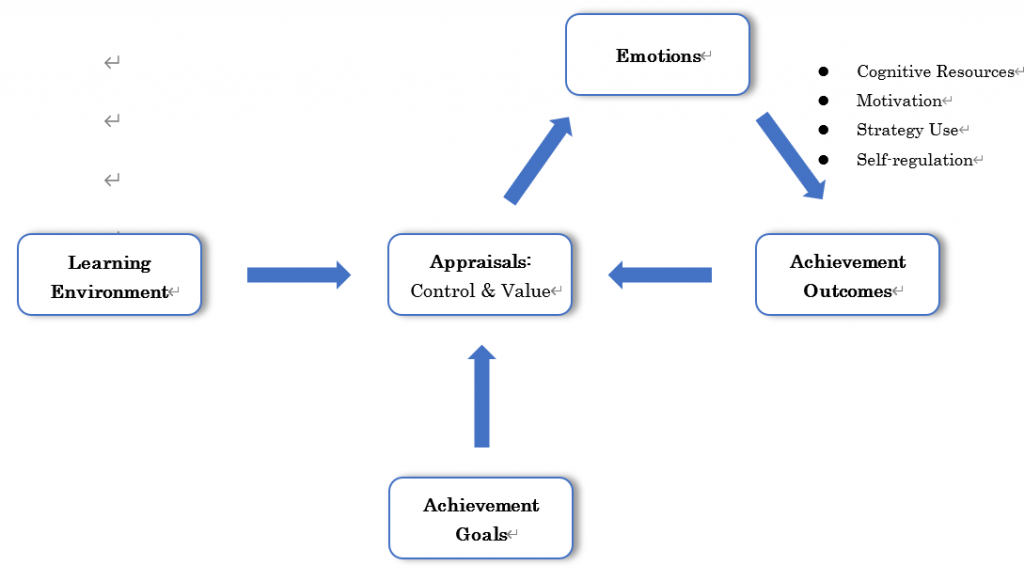This document provides three definitions (parenthetical, sentence, and expanded) of the term The Control-Value Theory of Achievement Emotions. This term was drawn from my previous studies in educational psychology. The purpose of this activity is to practice the skill of explaining a complicated and technical subject to an audience with no prior understanding of the subject.
Term: The Control-Value Theory of Achievement Emotions
Situation: A lecture notes companion for a first-year educational psychology course
Audience: First-year educational psychology students who have some knowledge of psychological constructs and processes associated with learning, but have no prior exposure to the control-value theory or scientific research on emotions.
Parenthetical Definition:
The control-value theory (an integrative approach for analyzing emotions) posits that achievement emotions are aroused by cognitive appraisals of control over, and the subjective value of, achievement activities and their outcomes.
Sentence Definition:
The control-value theory provides an integrative approach for analyzing various emotions experienced in achievement contexts, including academic settings as well as achievement situations in other life domains (e.g., sports, professional activities). The theory posits that these emotions are aroused by cognitive appraisals of control over, and the subjective value of, achievement activities and their outcomes.
Expanded Definition:
What is Achievement Emotion?
Emotions are multi-component, coordinated processes of psychological subsystems including affective, cognitive, motivational, expressive, and physiological processes (Pekrun, 2006). Emotions related to achievement activities or achievement outcomes are considered as achievement emotions, which can be conceptualized in trait-like or state-like ways in terms of temporal generality (Pekrun et al., 2011). For example, chronic test anxiety as measured by test anxiety scales is regarded as a trait emotion; anxiety experienced an hour before a specific exam would be viewed as a state emotion (Pekrun et al., 2011).
How to Interpret Control-Value Theory?
The control-value theory provides an approach for analyzing emotions by integrating propositions from the expectancy-value theory, the transactional approach and the attributional theory (Pekrun et al., 2011). The theory posits that achievement emotions are aroused by cognitive appraisals of control over, and the subjective value of, achievement activities and their outcomes (Pekrun et al., 2017). Control appraisals consist of perceptions of one’s competence to initiate and perform actions (action-control expectancies), and to produce desired outcomes (action-outcome expectancies); value appraisals refer to the perceived importance of these actions and outcomes (Pekrun et al., 2017). The interaction between these two appraisal antecedents helps to predict achievement emotions (Bieg et al., 2013).
Achievement Emotions and Achievement Outcomes
Achievement emotions play a crucial role in achievement outcomes by influencing students’ cognitive resources, motivation to learn, strategy use and self-regulation (Pekrun et al., 2010). Despite the fact that positive emotions are not always beneficial and negative emotions are not always detrimental, on most occasions, however, positive-activating emotions (e.g., enjoyment) typically exert positive effects while negative-deactivating emotions (e.g., boredom) produce negative effects. For positive-deactivating emotions like relaxation, and negative-activating emotions like anxiety, the effects are assumed to be more ambivalent (Pekrun, 2006).
Reciprocal Effects Model
Emotions, their appraisal antecedents and their achievement outcomes are linked by reciprocal causation (Pekrun, 2006). A longitudinal investigation conducted by Pekrun (2017) shows that students’ math-related positive emotions lead to repeated success in mathematics, increasing their perceived control, and thus facilitating positive emotions’ development (see Figure 1). For this reason, providing students with opportunities to experience success (e.g., evaluating achievement by intrapersonal standards) may strengthen positive emotions and reduce negative emotions (Pekrun et al., 2017).

FIGURE 1 – A reciprocal effects model linking emotion, appraisal and achievement
References:
Bieg, M., Goetz, T., & Hubbard, K. (2013). Can I master it and does it matter? An intraindividual analysis on control–value antecedents of trait and state academic emotions. Learning and Individual Differences, 28, 102–108. https://doi.org/10.1016/j.lindif.2013.09.006
Pekrun, R. (2006). The Control-Value Theory of Achievement Emotions: Assumptions, corollaries, and implications for educational research and practice. Educational Psychology Review, 18(4), 315–341. https://doi.org/10.1007/s10648-006-9029-9
Pekrun, R., Goetz, T., Daniels, L. M., Stupnisky, R. H., & Perry, R. P. (2010). Boredom in achievement settings: Exploring control–value antecedents and performance outcomes of a neglected emotion. Journal of Educational Psychology, 102(3), 531–549. https://doi.org/10.1037/a0019243
Pekrun, R., Goetz, T., Frenzel, A. C., Barchfeld, P., & Perry, R. P. (2011). Measuring emotions in students’ learning and performance: The Achievement Emotions Questionnaire (AEQ). Contemporary Educational Psychology, 36(1), 36–48. https://doi.org/10.1016/j.cedpsych.2010.10.002
Pekrun, R., Lichtenfeld, S., Marsh, H. W., Murayama, K., & Goetz, T. (2017). Achievement emotions and academic performance: Longitudinal models of reciprocal effects. Child Development, 88(5), 1653–1670. https://doi.org/10.1111/cdev.12704
Leave a Reply